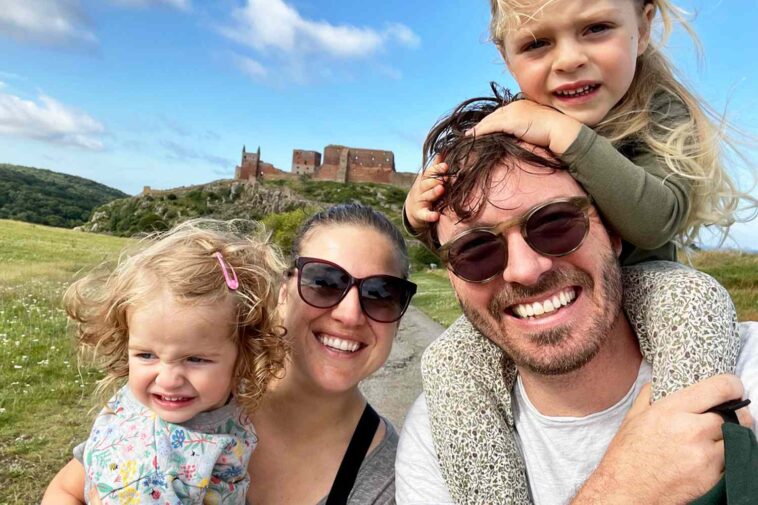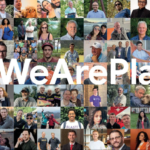Four years ago, just when the international borders were starting to shut down due to COVID, Brooke Black and her Danish husband decided to take their two daughters (then a newborn and 2 years old) to Denmark to stay with his parents, about three and a half hours outside Copenhagen.
“I’d had my second child a week before lockdown started,” the Los Angeles-based music publicist tells PEOPLE. “L.A. was a COVID hotspot at the time, and I didn’t feel safe sending my kids back to daycare, or know if they’d even open again. So my husband was like, ‘Let’s visit my family in Denmark and just wait it out.”

After they arrived, it quickly became apparent they weren’t going anywhere anytime soon.
“We only packed enough for two weeks,” she recalls of the world then truly locking down. As they settled into a quiet life in the tiny Danish village “surrounded by cows,” she says they began to fall in love with the pace of life. “Everything just seemed manageable there,” she explains. “I’d only lived in big cities (Chicago, New York and L.A.) so to be in the countryside felt special.”
After two years of renting a temporary place near her in-laws, a 1722 farmhouse came on the market in the village. “My husband was like, ‘Should we just stay?'” she says.
At that point, her daughters’ Danish was amazing from going to the local school. “We thought about it and decided we wanted our kids to speak Danish, and have Danish values.”
They bought the farmhouse and moved in. A year later, new job offers brought them to the capital city of Copenhagen, where they all now reside in a house near the city center, and Black chronicles her expat adventures on her TikTok and Instagram under @Brookblackjust.
Below, she opens up to PEOPLE about why she loves living there so much — and what she still misses about the US.
Parents and Children Are Top Priority
Parental leave in Denmark is much more generous: Women get four weeks off before they give birth, and a combined 52 weeks off afterward.
“It’s such a family-forward place,” she says of Denmark, noting that children and their needs are always thought of.
“At the town recycling center, you’re a parent on a boring errand, sorting your things, and they have all these toys out for the kids. There’s free hot cocoa and coffee for the parents. The guy who runs it hands out lollipops to the kids. If a strange man was handing out a lollipop to my kid in the US, I would rip it out of their hands. But things like that just make your life a little bit easier because you’ve been thought of as a human after you have kids. Like, ‘Hey, let’s give your kid a free bun in the grocery so they can eat while you’re shopping.’ When that first happened I was like really? This is so nice!”
Brook Black’s youngest daughter soon in Denmark.
Courtesy of Brooke Black Just-Oleson
The Community Feel is Real
“In the countryside, all the neighbors would eat together in a community house every two weeks,” Black says. “There was nothing going on in this area so it felt amazing to have this community moment, to be social with the kids all running around. It’s really cheap dinner and then you go back to your house and you feel like you went out for the night. It was the nicest feeling.”
She adds that the best part was that you’d socialize with people of all ages, with all sorts of jobs. “It wasn’t like I was just hanging out with people my age in my field like I usually would, it was carpenters and doctors and people with all different kinds of jobs. It was almost like jury duty — a completely varied set of people. So that was really special.”
The small village in Denmark with Brooke Black lived with her family.
Courtesy of Brooke Black Just-Oleson
It’s Expensive — But Schooling and Childcare are Affordable
“Housing is expensive,” admits Black, noting it’s particularly pricey in Copenhagen. Taxes are also high: “Somewhere between 52 and 56%,” she says. “But I know most Danes are happy to pay their taxes. I know I am. I get free healthcare. And the cost of daycare is much cheaper. I think in L.A. I was paying at least $2,200 a month for a single kid, and that would have doubled. But here it’s between $300-$500 a month.”
She continues, “You also get $225 a quarter per child from the government. If there’s a single parent that needs help with housing or school, they are able to get support, and the same goes for senior citizens. The idea is no one is homeless unless they choose to be. It just feels like everyone has enough. And I read that Danes often top the “happiest country” lists because of this equality, and not coveting what their neighbor has. I do think that’s the secret.”
Brooke Black’s daughter in the Danish countryside.
Courtesy of Brooke Black Just-Oleson
She Feels Safer in Many Ways
Black says that she feels completely at ease riding her bike alone in the dark in Copenhagen — and that she never worries about things like school shootings, or even theft. “You can leave your bag or laptop or phone on the table,” she says. “I had to get used to that.”
She also worries less about her kids, who she says roam freely over to the neighbor’s house to play.
“Here, safety is on the individual. I’ve been to many places, for example an activity park for kids, and there’s no one operating the rides. They’re self-operated. It’s almost like my ’80s childhood, where there’s this level of trust and personal responsibility. I was so excited by this that when my kids were on a ride, I made a big announcement that the train was about to start before I pressed the button and everyone just stared at me. Like, ‘Yes, this is just a normal part of life.’ Free-range parenting is a thing here. The school also takes them on trips and we don’t know about it until afterward. They’ll say, ‘We went to the zoo and on a canal tour with the class!”
Brook Black and her husband Mads.
Courtesy of Brooke Black Just-Oleson
Many Companies Have Great Vacation Policies
“If we’re being real, it’s impossible to compare a country of 5 million to the U.S.,” Black says. “Denmark can be the greenest country because we have a much smaller population. It’s an unfair comparison. But I do dream that the U.S. could implement some of the small things we do here.”
One thing in particular?
“Prioritizing families more,” she says. “I’m in the middle of the three to four-week period in the summer that all Danish companies are encouraged to give to their employees a long summer vacation, and most truly shut off and go be with their families. I think we feel like three-day weekends are a luxury, but I feel like Danish workplaces are better at acknowledging that we’re human and there’s a balance to everything. But it’s also about trust. It’s about companies saying, ‘We know you have a family and we also know you’ll get your job done.'”
Nyhavn in Copenhagen in Denmark.
©Getty Images/Robert Craig/EyeEm
Parenting Duties Can Feel More Balanced
“It feels more equal here,” she says of the fathers pitching in on domestic duties. “I was amazed to see how many male teachers are in the daycares here and in schools. I was so pleasantly surprised. There’s no stigma. It’s not like daycares are just for women. There’s so much male influence and it’s a different way of playing and thinking. And my kids both look up to these really lovely guys.”
She adds, “With my husband, I always wondered how he’s so good at the domestic stuff that some people stereotypically think is just traditionally women’s work on top of everything else, but I think a lot of Danish guys learn from an early age that sharing the parental load equally is just what you do. They’re very present dads, cooking with their kids and baking, things like that.
Brooke Black’s daughter slept in her stroller outside, which is customary in Denmark.
Courtesy of Brooke Black Just-Oleson
So What Does She Miss About America?
“I’d say the food quality and regulations are better (in Denmark),” she says. “For example, there’s no Red 40, which is banned. But I miss a lot of food variety. There’s not a lot of spicy food here. The local meals are a lot of heavy, dark rye bread, cheeses, sugar, and very cozy type of food with a lot of heavy cream. There’s also a lot of alcohol — Danes can drink!”
She adds, “I also miss some basic things, like going to Target and getting the kids cute cheap clothes. or cravings I used to take for granted like Barq’s Diet Root beer, string cheese. It’s really random things, like going out to lunch and getting a salad. Danes often bring a packed lunch (called a madpakke) and coffee in a thermos because it’s silly to go out and spend money on an expensive coffee shop, but I do miss variety. Give me 16 Handles, just a bunch of fro-yo with tons of toppings. I miss delis. I was part of a pastrami club in L.A. where we would always go to a different deli every month. I miss Dr. Brown’s Cel-Ray soda. I miss my friends.”
She adds, “It can be lonely. The language barrier is hard.” (She is learning the language and says it’s improving.) “My husband and kids will be listening to the radio and laugh at something and I won’t be able to understand. It’s hard to break into a big group of Danes if you can’t follow the conversation.”
Brooke Black in the one-piece she wears in the winter.
Courtesy of Brooke Black Just-Oleson
The Weather Can Be Tough
“Sometimes I can’t believe how wonderful it is here, and other times when the weather’s bad and I have to bike the kids to school and the wind is blowing sleet in my eyes and it’s dark and I’m far away from my besties… it is not going to be 100% perfect. That’s life. But it is a place I never expected we would end up, and without the pandemic, we wouldn’t have come.”
She says, for now, they’re staying. “I’m really glad that we were given this opportunity. I used to be like, ‘Oh, well it’s for the sake of the kids.’ But it’s also for me now. For all of us. And we get to go to anywhere in Europe. I still have so much to explore in Europe. There are so many places I’d like to see. I thought I’d been to Europe a lot as an American, and I still don’t know anything.”





GIPHY App Key not set. Please check settings